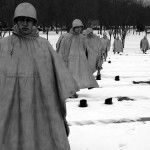Remembering the Forgotten War
 Like some view Afghanistan today, soldiers during the Korean War wondered if the cause was worth dying for.
Like some view Afghanistan today, soldiers during the Korean War wondered if the cause was worth dying for.
It was exactly 60 years ago – June 25, 1950 – that the army of North Korea’s Kim Il-Sung, encouraged by Josef Stalin, invaded the south in hopes of uniting the peninsula.
Thus began the Korean war.
It lasted a month over three years and resulted in over a million UN casualties, of which 1,500-plus were Canadian (500-plus killed). Some 54,000 American soldiers were killed, close to a million South Korean soldiers and civilians killed, and an estimated 1.5 million Chinese and North Korean casualties.
Yet until recently, the “war” was officially regarded as a “police action.”
Some police action!
When the war started, Canada at first dragged its feet. Didn’t think it would last long. But when the North Koreans surged south, captured Seoul and drove the Americans to the tip of Korea at Pusan, then-Prime Minister Mackenzie King realized we’d have to get more involved.
By 1950, WWII had been over for five years, and our military was depleted – back to civvy life. A Special Force was recruited – a battalion of volunteers that was a blending of young men who had missed the big war and wanted adventure, and sweats of WWII who, for various reasons, missed the camaraderie of army life, couldn’t find jobs, were restless or had other personal reasons.
They became the second battalion of the Princess Pats, and a rough bunch they were, under the command of Lt.Col. Jim Stone who molded them into a formidable fighting force.
By the time the armistice was signed in 1953, 26,000 Canadians had served in Korea – Three battalions each of the Patricias, RCR and Vandoos, plus armoured squadrons from the Dragoons, Lord Stratchconas, as well as artillery and support units.
The 25th Canadian Brigade was, arguably, the strongest fighting unit Canada ever assembled - part of the 1st Commonwealth Division, to which every country over-subscribed.
For what it’s worth, Canadians did not lose an inch of ground. Never retreated, and when attacked would call allied artillery down on their positions – witness the battles of Kapyong, and perhaps 355.
I was a soldier during the last year of the Korean war – a platoon commander with the Princess Pats, later battalion intelligence officer, then attached to the U.S. air force directing air strikes at attacking Chinese.
I was also one of many young men who caught the tail end on WWII (Navy – Fleet Air Arm) and still thirsted for more.
For many, Korea was frustrating. What started as a fluid, WWII-like mobile war, ended in WWI-style trench warfare, with our side perpetually on the defensive and forbidden to attack during truce negotiations at Panmunjon. Just patrols and defending against attacks. Maddening, when all of us hungered to retaliate.
The demarcation line at the 38th Parallel was steadily nibbled away by Chinese attacks – all except Commonwealth Division, which wouldn’t budge. By the end of the war, soldiers were cynical and disillusioned.
Like some view Afghanistan today, soldiers wondered if Korea was worth dying for, especially when we thought we could win but couldn’t fight back.
Returning home in those days was without fanfare or appreciation. Our dead were buried in Korea – among comrades, it turns out, and somehow reassuring and comforting for those who survived.
Korea became the forgotten war. At home, no one much cared. Returning soldiers went on with their lives, expecting little. And little they got. Koreans, however, remembered. Still remember. That government instituted a policy of inviting veterans back to Korea, to see the country they had helped save from communism.
While a truce” is not “peace,” it is clear that the war was won – the North was defeated and South Korea thrived. I think ever soldier who served there and returned on a re-visit program, gained a new appreciation.
The frustrations of 60 years past evolved into realization that the sacrifices were worth the result. The grace and gratitude of Koreans today towards those who fought as young men on their behalf, rarely fails to touch even the most cynical of veterans.
Would that Afghanistan eventually turns out the same way…